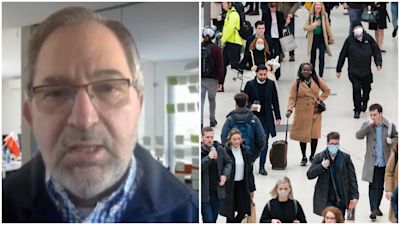Explainer
Rise in Covid hospitalisations 'inevitable', says University of Warwick virologist

Professor Lawrence Young tells ITV News Central the rise in cases was "really worrying"
By ITV News Central Journalist Barnaby Papadopulos
Covid cases are on the rise again across the Midlands as data from the department of Health and Social Care revealed more than 1,700 patients had been admitted to hospital in a week.
Figures from last Friday suggested that cases had risen by around 44% in just one week, with hospitalisations up almost 25% and a small increase in deaths.
It's no longer a legal requirement to self-isolate if you contract coronavirus, and the government is planning to scrap free lateral flow tests from April 1, 2022.
For many of us, life feels achingly close to what it was pre-pandemic.
So, how worried should we be?
ITV News Central spoke to Professor Lawrence Young, a virologist at the University of Warwick, to find out.
How serious is the Covid situation in the UK, and the Midlands?
"Really, really worrying," says Professor Young.
"We've had more than 300,000 cases a day. These are the highest levels we've seen particularly in the 70+ age group - in fact, it's the highest it's ever been in that age group.
"Really high levels of infection, and also we're starting to see an increase in hospitalisation."
He also pointed out the relaxation of almost all measures to deal with the virus could be to blame, alongside the emergence of a more infectious variant of the Omicron strain of Covid.
"What we've got here really is a perfect storm," he said, before adding: "It's the removal of all control measures, it's waning immunity, because we know that both vaccine induced immunity and immunity you get from being infected decays over time, and we're seeing that now.
"And superimposed on that we've got a more transmissible sub-variant of the Omicron virus, and that's at least 30% more infectious than Omicron."
If infections rise will hospitalisations - even though many of us have had three vaccines?
A rise in hospitalisations is "inevitable", says Professor Young
"It's inevitable that when you've got such really high levels of infection that the virus is going to seek out the most vulnerable," he said.
"We're seeing a 25% increase in hospitalisations. It's true to say that when you've got such vast numbers of people infected, probably only around 50% of that group of people being hospitalised are hospitalised because of Covid.
"The other 50% are being hospitalised for other reasons but when they get into hospital, they get tested, they turn out to be Covid positive."
What needs to be done to stop the rise in cases?
Professor Young says testing for Covid is "so important"
Currently, we can get Lateral Flow Tests for Covid-19 for free, from pharmacies, by ordering online, or going to walk-in clinics.
This is set to change from April 1st. But faced with rising case numbers, Professor Young urges everyone "we need to keep testing."
He said: "A concern is that as soon as you scrap the availability of free testing, then people aren't going to bother to test, they're not going to bother to stay at home and isolate if they're infected, and we're just going to get this cycle of infection."
"The worry is this virus will keep circulating, and as long as it keeps circulating a group of people will get sick, and the virus is still able to change and generate variants."
"Then we've got superimposed on this all removal of travel restrictions, and we should learn from past experience that viruses that are nastier than the original COVID can get into the country, as did delta and Omicron."
"We are in a very delicate situation."
We were told that vaccination was our way out of this. What else can be done?
Professor Young says we need to think about "protections, rather than restrictions."
The figures are worrying, and some people may be getting a sense of security being dashed. But Professor Young isn't advocating for more lockdowns - rather, we need to learn to adapt to a new world.
"People would love for the virus just to have disappeared and gone away, but we can't live ignoring the virus, it's still there," he said.
"A lot of this is about how we adapt. How we think about protections rather than restrictions - so continued use of face masks for instance in crowded, poorly ventilated places.
"Making sure that people get vaccinated...only 67% of the population have had their third booster jab."
"It's about how we all go about our daily business and how we think about protecting our family and the rest of the community."